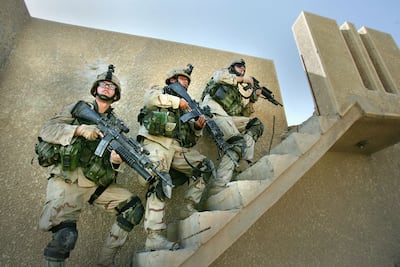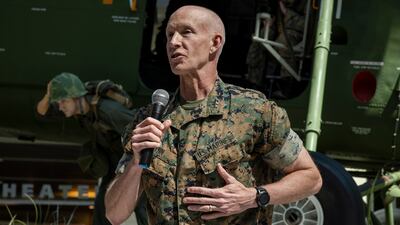Live updates: Follow the latest news on Israel-Gaza
A three-star general has returned to the US after spending several days advising the Israeli military as it prepared to increase its ground operations against Hamas in the Gaza Strip, the Pentagon said on Monday.
Lt Gen James Glynn, who helped to lead special forces as they battled ISIS in Iraq and Syria, and who saw fierce fighting in Fallujah during the Iraq War, is one of a team of senior US officers sent to advise Israel.
As the civilian death toll in Gaza soars, he gave advice to Israeli leaders on how to try to avoid civilian casualties and offered experience from his years of urban warfare, the Pentagon said.
“Lt Gen Glynn was one of a few officials with a relevant experience who the Department of Defence asked to help Israeli officials think through difficult questions that they need to consider as they conduct their planning,” a senior US defence official said.
His trip was “intended to offer observations informed by extensive military expertise and pose hard questions to the [Israel military] as they think through various scenarios.”
The Biden administration has repeatedly stressed its unequivocal support for Israel as it attacks the Gaza Strip, sometimes with US munitions.
But the death toll in the densely populated Palestinian territory is forcing the Pentagon to urge the Israeli military take civilian life more into consideration when planning strikes.
The Gaza Health Ministry on Monday said the death toll among Palestinians passed 8,300 people, mostly women and children.
US Secretary of Defence Lloyd Austin is having “near daily” conversations with Israeli Defence Minister Yoav Gallant, Pentagon spokeswoman Sabrina Singh said, with civilian lives a topic of conversation.
“The way I would say we've been interacting with the [Israeli military], and certainly with Minister Gallant, is asking the questions that we would ask ourselves on how to best preserve civilian lives on the ground, but also helping them understand how complicated urban warfare is,” Ms Singh said.
Israel intensifies attack on Gaza – in pictures
US officials stressed that the Israeli military is making its own decisions, and American officers are neither directing nor advising operations.
The US has plenty of experience when it comes to high civilian death tolls during military campaigns.
According to an AP investigation, as many as 10,000 people were killed during the eight-month siege to liberate Mosul from ISIS.
This included at least 3,200 civilians from air strikes, artillery fire or mortar rounds between October 2016 and the fall of ISIS in July 2017.
About the same number of civilians were killed or taken hostage and used as human shields by militants as they fled the city, AP reported.
The situation in Gaza poses a seemingly intractable problem for Israeli military planners who have vowed to wipe out Hamas.
The militant group has a network of tunnels. Fighting will be a gruelling, building-by-building slog, in the sort of booby-trap-infested urban environment as was seen by US forces fighting insurgents in the second Battle of Fallujah in 2004.
“We have lessons learnt from urban warfare, whether it's in Mosul or in Fallujah.," Ms Singh said.
"So that was one of the things that Gen Glynn brought to the table, of just how complicated urban warfare can be, and asking the right questions of the Israelis on in terms of their planning and how they were thinking through their operations."
Israel says Hamas uses schools and hospitals, making them legitimate military targets. But for every civilian killed, Israel draws increased global condemnation for what critics see as a heavy-handed campaign.
Israeli Prime Minister Benjamin Netanyahu on Monday defended his decision to escalate the offensive with a ground push into Gaza, which families of the more than 200 hostages held by Hamas have criticised for endangering their relatives.
“We think this method stands a chance” of securing the release of the captives, Mr Netanyahu said.
































